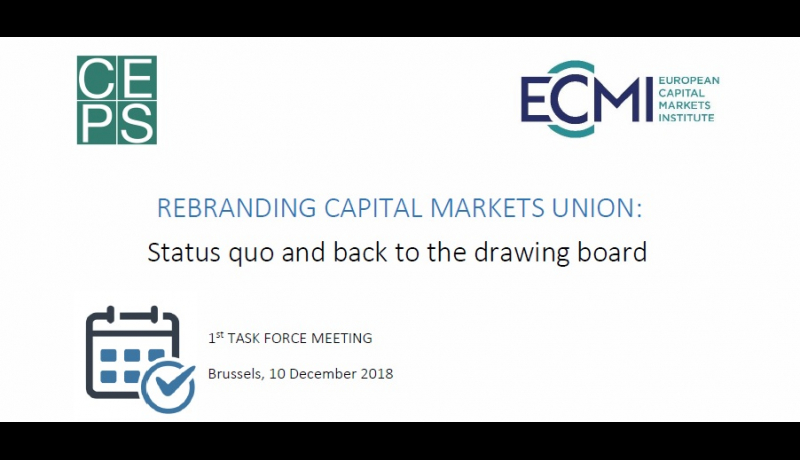First Meeting - Task Force on Rebranding CMU
AGENDA
12:00 – 13:00 Registration & lunch
13:00 – 13:30 Introductory remarks & Tour de table
- Chairman: Vítor Constâncio, former ECB Vice-President, and current President of the Council of the Lisbon School of Economics & Management (ISEG)
- Rapporteurs: Karel Lannoo, CEO of CEPS and General Manager of ECMI, and Apostolos Thomadakis, Researcher, CEPS-ECMI
13:30 – 15:00 Session 1. Status-quo: Creating favourable conditions for firms and investors to participate in capital markets
One of the two objectives of CMU is to promote and strengthen market-based financing as an alternative to banking channels. While encouraging financing through capital markets in general, the Action Plan focuses on particular market segments: small and medium-sized enterprises (SMEs), long-term infrastructure, venture capital, private placements and securitisations. While progress has been made and certain legislative proposals have been adopted (e.g. Prospectus Regulation, EuVECA and EuSEF, STS Securitisation), market-based financing still plays a minor role in most European countries.
- Have firms, particularly SMEs and high-growth potential firms, been successful in entering and raising capital on public and private capital markets?
- Has retail and institutional investors’ participation in capital markets been fostered? Does the current supply of products meet their real savings/investment needs?
- Does the current regulatory framework (at national and EU level) provide adequate incentives for long-term, sustainable investment, on a cross-border basis?
Presentations
- Jung Lichtenberger, Deputy Head of Unit, DG FISMA, European Commission
- Pablo Portugal, Managing Director, Advocacy, AFME
Roundtable discussion
15:00 – 15:15 Coffee break
15:15 – 16:45 Session 2. Status-quo: Supervising more integrated capital markets with new technological developments
The second objective of CMU is to increase the private risk sharing capacity through cross-border holdings of assets resilient to asymmetric shocks. For this to happen, national barriers to cross-border investment should be removed (e.g. insolvency proceedings, tax barriers, etc.), supervision to be centralised in many areas, market infrastructures to be improved, and financially literacy to be fostered. To date, only a few of them have been given attention. Certainly, FinTech and the development of new technologies have an important role to play. However, it remains to be seen whether it will be sufficient to overcome the barriers to private risk sharing.
- Have capital markets increased private-sector risk sharing capacity?
- Have national differences in company and securities law, accounting, insolvency and taxation procedures been resolved?
- Has the CMU enhanced supervisory convergence? Are the ESAs and NCAs better equipped now to deal with regulatory/market/technological challenges?
Presentations
- Jean-Paul Servais, Chairman, FSMA
- Alexander Popov, Principal Economist, Financial Research Division, ECB
- Alexandros Seretakis, Assistant Professor in Law, Trinity College Dublin
Roundtable discussion
16:45 – 17:00 Conclusions & next steps
PARTICIPATION
- This is a closed-door meeting and the participation is limited to the members of the Task Force, academic/policy/industry observers and selected invitees. Detailed information is available here.
- Please do not hesitate to contact Apostolos Thomadakis by email at: [email protected] or by phone on +32 222 93 914.

